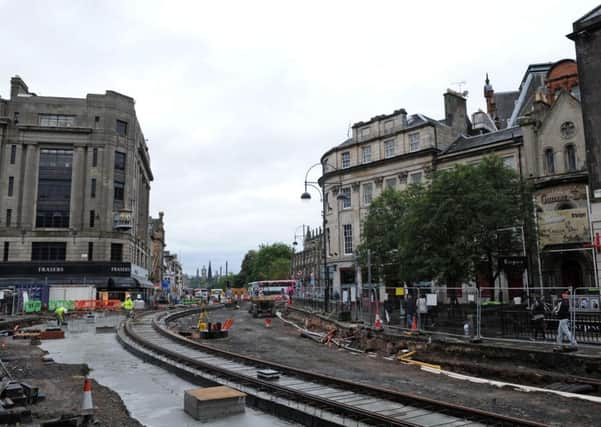Edinburgh tram inquiry: Council not told about £40m cancel fee


Figures published by the ongoing public inquiry show termination costs were being circulated in March 2010, a year before the city council voted to continue the project at a cost of £770m.
At that time, councillors were told cancelling the project would cost £750m.
Advertisement
Hide AdAdvertisement
Hide AdNewly published documents dating from 2010 show officials were considering a number of options for continuing with the project which ranged in cost from £644m to £674m. At that time, the official cost of the tram project was £545m.
An email shared by senior council officials showed they believed the project could be scrapped for £388m, which included the £40m termination cost and returning Scottish Government funding already spent on the works.
The figures were part of the secretive Project Pitchfork, a high-level assessment of the costs associated with the trams carried out more than a year before councillors voted in favour of an option to take the line as far as the city centre. An email from finance officer Alan Coyle to Donald McGougan, then head of finance, and Dave Anderson, who was director of city development, set out a range of options for continuing with the project.
One option, costing £666m, which involved continuing with the ongoing dispute resolution process, was referred to as the “grind it out option”.
Advertisement
Hide AdAdvertisement
Hide AdThe following year, councillors were presented with a series of options, including borrowing more than £200m to take the line to the city centre for £770m or scrapping the project for £750m.
Evidence submitted to the inquiry, which has been seen by Scotland on Sunday, shows senior councillors were unaware of Project Pitchfork.
In a statement given to the inquiry, former Labour councillor and city transport convener Lesley Hinds said: “I do not remember Operation Pitchfork ever being discussed with me as a councillor.
“I do not remember being advised of the levels of figures referred to in the documents around that time either. These were alarming numbers. They were discussing a figure of around £645m instead of the £545m we had in mind.”
Advertisement
Hide AdAdvertisement
Hide AdIn her submission, former Lib Dem council leader Jenny Dawe said: “I heard the term Operation Pitchfork, but I did not have any detailed knowledge of what it was about.
“Council officers and Tie [Transport Initiatives Edinburgh] members did not come to me, at this time, to discuss the three options.
“As far as I know, the options and cost estimates were not discussed with any councillors except, potentially, those on the relevant boards.”
The tram inquiry, led by Lord Hardie, has published thousands of pages of previously confidential documents and email exchanges relating to the project.
Advertisement
Hide AdAdvertisement
Hide AdIt has led to claims elected members were kept in the dark about the true scale of difficulties being faced by the project as well as the cost of what became known as an “amicable divorce” with the contractor, Bilfinger Berger.
Jeremy Balfour, a former Tory councillor who is now a Lothians MSP, said there had been a deliberate attempt to mislead.
“There was a lack of information given to councillors and we were making decisions not on the best information,” he said.
“Clearly officers had an agenda and the agenda was to build the tram. I think they withheld information to allow them to get to that end goal.
Advertisement
Hide AdAdvertisement
Hide Ad“Officers just did not tell the truth to elected members. Ultimately, decisions were made on incorrect information. We were put in a situation where we could not make the correct decisions because we were not given the correct information.
“If we had all the information back in 2010 about what type of contract it was, where the risks lay ... I think a number of my colleagues, including myself perhaps, would have voted in a different way. It’s part of a jigsaw of pieces that were missing when we made that really important decision. I think undoubtedly there would be a number of people who would have voted differently.”
A spokesman for Edinburgh City Council said: “The council has co-operated fully with the tram inquiry since it was announced in 2014 and will continue to do so.
“Lord Hardie has a significant amount of detail to consider in his deliberations, both in terms of evidence already submitted and that now being given orally, and it would be wrong of us to comment on matters which are still the subject of the ongoing inquiry.
Advertisement
Hide AdAdvertisement
Hide Ad“We hope his recommendations will be of value to the planning, commissioning and delivering of major infrastructure projects in future. We have created a schedule for developing the case for extending the tram to Newhaven which should give ample time for considering lessons learned from the inquiry.”